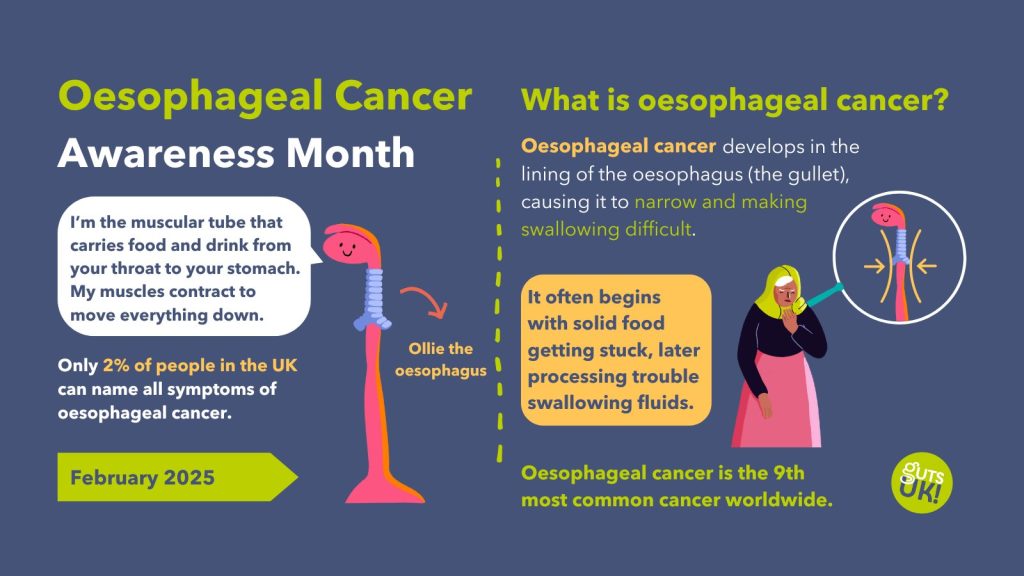Posted: 14/02/2025
February is Oesophageal Cancer Awareness Month
Reading Time: 2 minutes
Oesophageal cancer is a serious disease that affects the oesophagus, the muscular tube connecting the throat to the stomach. This type of cancer typically develops in the lining of the oesophagus and is classified into two main types: squamous cell carcinoma and adenocarcinoma. It is more common in older individuals and is often diagnosed at an advanced stage due to its subtle early symptoms.
What is Oesophageal Cancer Awareness Month?
Oesophageal Cancer Awareness Month is observed every February to highlight the importance of early detection, raise awareness about risk factors, and promote research into more effective treatments. Various organisations, charities, and healthcare institutions use this time to educate the public on the disease and encourage people to seek medical advice if they experience concerning symptoms. The month is also an opportunity to support patients and families affected by the condition.
Key Facts About Oesophageal Cancer
- Oesophageal cancer is the seventh most common cancer globally, with a high mortality rate due to late diagnosis.
- Over 9,000 people are diagnosed with oesophageal cancer in the UK each year.
- Risk factors include smoking, excessive alcohol consumption, acid reflux (GORD), obesity, and diets low in fruits and vegetables.
- Men are more likely to develop oesophageal cancer than women.
- Survival rates improve significantly with early detection and treatment.
- Symptoms often go unnoticed until the cancer has progressed, making awareness crucial.
Signs and Symptoms to Look Out For
Oesophageal cancer symptoms can be subtle in the early stages but may include:
- Persistent difficulty swallowing (dysphagia)
- Unexplained weight loss
- Chronic heartburn or acid reflux
- Chest pain or discomfort
- Hoarseness or persistent cough
- Vomiting or regurgitation of food
The symptoms of oesophageal cancer can also be associated with other, less serious conditions. For example, because heartburn is so common – you, and most adults, have likely experienced it at some stage, it is easy to downplay, ignore or dismiss its persistence when it seems there is no obvious cause.

If you experience any of these symptoms persistently, it is vital to consult a healthcare professional for further evaluation. Early diagnosis can significantly improve treatment outcomes. Treatment for oesophageal cancer depends on various factors, such as where the cancer is, how far it has grown, if it has spread, the type of cancer and your general health and fitness.
The most common treatments are:
- surgery
- radiotherapy
- chemotherapy
- combined chemotherapy and radiotherapy (chemoradiotherapy)
- targeted and immunotherapy cancer drugs
- treatments to control symptoms
Surgery is the most common treatment if your cancer hasn’t spread. Surgeons can remove all or part of your oesophagus. For very early cancer, the surgeon just removes cancer from the lining of your oesophagus. If there is a delay in diagnosis, this can allow the cancer to spread elsewhere in the body and result in a significantly worse outcome.
If that delay is due to negligence, such as a failure by medical professionals to appropriately investigate symptoms, you may be able to bring a claim for medical negligence. If you feel that you or your loved one has experienced delay in diagnosis of oesophageal cancer, please contact our experienced medical negligence department to discuss how we can assist you.
FRIENDLY, EFFICIENT LEGAL ADVICE
We’re ready to chat when you are
Drop us an email or give us a call for a no obligation chat to see if we can help.
